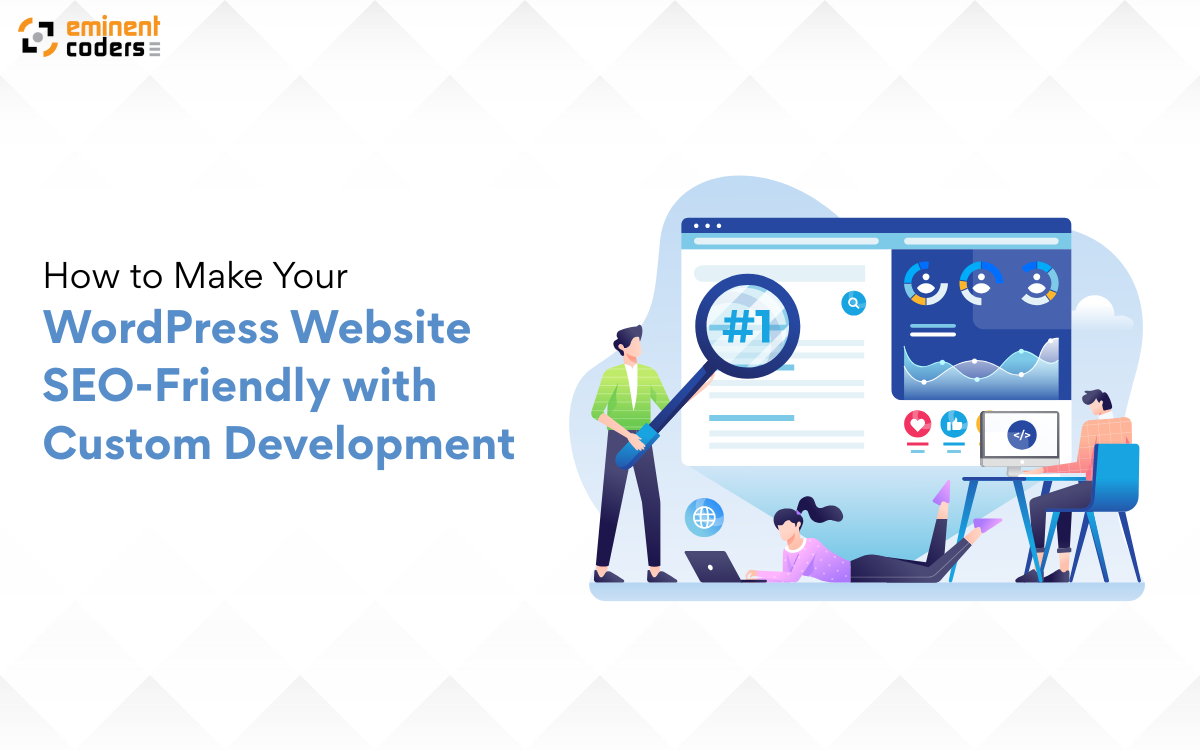How to Make Your WordPress Website SEO-Friendly with Custom Development

Introduction
WordPress powers over 40% of websites globally, making it one of the most popular CMS platforms. However, simply having a WordPress site doesn’t guarantee high search engine rankings. To compete effectively, you need a WordPress website SEO-friendly with custom development. Custom development allows you to tailor every aspect of your website—from theme and plugin functionality to speed optimization—ensuring your site meets modern SEO standards.
In this article, we’ll explore actionable strategies for creating an SEO-friendly WordPress website using custom development techniques.
1. Choose a Clean and SEO-Friendly WordPress Theme
A theme impacts both your website’s design and its SEO performance. Using a lightweight, well-coded custom WordPress theme ensures faster loading times and better search engine indexing.
Key considerations:
-
Minimalist code to reduce bloat
-
Responsive design for mobile optimization
-
Schema markup support
-
Clean URL structure
Tip: Avoid using themes with excessive built-in features you don’t need. These can slow down your site and negatively impact SEO.
2. Optimize Website Speed and Performance
Website speed is a major ranking factor in Google’s algorithm. Custom development allows you to optimize performance beyond what standard plugins offer.
Strategies for speed optimization:
-
Minify CSS, JavaScript, and HTML files
-
Implement lazy loading for images and videos
-
Use a content delivery network (CDN)
-
Optimize database queries and remove unnecessary plugins
-
Enable caching for faster page loads
Benefit: Faster websites improve user experience, reduce bounce rates, and increase rankings.
3. Create a SEO-Friendly URL Structure
URLs play a significant role in SEO. Custom development ensures your WordPress site generates clean, descriptive URLs.
Best practices:
-
Include target keywords in URLs
-
Avoid special characters, numbers, and excessive parameters
-
Keep URLs short and descriptive
-
Use hyphens to separate words
Example:
-
SEO-friendly:
www.example.com/custom-wordpress-development -
Not SEO-friendly:
www.example.com/?p=12345
4. Implement Schema Markup and Structured Data
Schema markup helps search engines understand your website’s content and display rich snippets in search results. Custom development enables advanced schema implementation beyond plugin limitations.
Benefits:
-
Enhances search visibility
-
Improves click-through rates (CTR)
-
Supports featured snippets
Popular schema types for WordPress sites:
-
Article schema
-
Product schema for eCommerce
-
FAQ schema
-
Local business schema
5. Optimize On-Page SEO
On-page SEO ensures each page of your WordPress website is structured for search engines. Custom development allows flexible control over headings, meta tags, and content structure.
Key on-page elements:
-
Title tags with primary keywords
-
Meta descriptions optimized for CTR
-
Heading hierarchy (H1, H2, H3) for content structure
-
Internal linking to relevant pages
-
Keyword-rich alt text for images
Pro Tip: Avoid keyword stuffing. Focus on user intent and content quality.
6. Implement Mobile-First Design
With Google prioritizing mobile-first indexing, your WordPress website must perform flawlessly on mobile devices. Custom development enables:
-
Responsive layouts that adapt to all screen sizes
-
Fast mobile loading speeds
-
Touch-friendly navigation and buttons
Benefit: Mobile-friendly websites rank higher and provide better user experiences.
7. Enhance Website Security
Security indirectly affects SEO because websites prone to malware or hacks are penalized by search engines. Custom development can integrate robust security measures:
-
HTTPS (SSL certificate) for secure browsing
-
Custom login security features
-
Regular malware scans and firewalls
-
Restricting plugin vulnerabilities
Result: A secure site improves trust and keeps search engine rankings intact.
8. Optimize Images and Multimedia
Images and multimedia improve engagement but can slow down a website if not optimized. Custom development allows:
-
Automated image compression
-
Proper image sizing for different devices
-
Use of WebP format for faster loading
-
Lazy loading for non-critical images
Tip: Always include descriptive alt text for images to improve SEO and accessibility.
9. Use Custom Plugins for SEO
While WordPress has popular SEO plugins like Yoast or Rank Math, custom plugins offer tailored solutions that match your unique SEO needs:
-
Custom sitemap generators
-
Schema markup plugins for advanced structured data
-
Plugins for automated internal linking
-
Custom performance optimization plugins
Benefit: Full control over SEO without unnecessary bloat from generic plugins.
10. Leverage Internal Linking and Site Architecture
A well-structured site with strategic internal linking improves crawlability and user navigation. Custom development helps create:
-
Custom menus and category structures
-
Breadcrumb navigation
-
Optimized internal links pointing to key pages
Impact: Search engines can index your site more efficiently, and users can find content easily.
11. Integrate Analytics and SEO Tracking
Custom WordPress development enables seamless integration of tools like Google Analytics, Search Console, and other SEO trackers. This helps:
-
Monitor keyword performance
-
Track organic traffic growth
-
Identify technical issues affecting SEO
-
Adjust strategies based on real-time data
Pro Tip: Implement event tracking and conversion goals for better insights into user behavior.
12. Regular Content Updates and Blog Integration
An SEO-friendly WordPress website thrives on fresh content. Custom development allows:
-
Easy-to-manage blogging features
-
Optimized content layouts with headings and media
-
Custom post types for niche-specific content
-
Automatic RSS feeds for content distribution
Tip: Focus on long-tail keywords and high-quality, original content for better search rankings.
13. Technical SEO Optimization
Technical SEO ensures search engines can crawl, index, and understand your website. Custom development gives you control over:
-
Robots.txt and XML sitemaps
-
Canonical tags to prevent duplicate content
-
301 redirects for broken URLs
-
AMP (Accelerated Mobile Pages) for faster mobile performance
Result: Improved site indexing, reduced errors, and better SERP rankings.
Conclusion
Creating a WordPress website SEO-friendly with custom development is essential for businesses looking to boost organic traffic and improve search rankings. Custom development ensures your website is fast, secure, responsive, and optimized for both users and search engines.
From choosing a lightweight theme to implementing schema markup, optimizing images, and building a solid internal linking structure, every detail matters. By combining these strategies with quality content and ongoing SEO monitoring, you can achieve long-term success with your WordPress website.
Investing in custom WordPress development is not just about design or functionality—it’s about creating a future-ready, SEO-optimized website that grows your business online.
FAQs About Making WordPress Websites SEO-Friendly with Custom Development
Q1: Can I make my WordPress site SEO-friendly without custom development?
Yes, plugins like Yoast or Rank Math can handle basic SEO. However, custom development ensures full control over speed, code quality, schema, and advanced SEO strategies, which standard plugins may not provide.
Q2: How long does it take to see SEO results after custom development?
Typically, you may notice improvements within 3–6 months, depending on content quality, backlinks, and competition. SEO is a long-term strategy.
Q3: Are custom WordPress themes better for SEO than pre-built themes?
Yes. Custom themes are lightweight, optimized for performance, and built according to your SEO strategy, unlike some pre-built themes that may have unnecessary code and slow loading times.
Q4: What is the role of schema markup in WordPress SEO?
Schema markup helps search engines understand your content and display rich snippets, increasing visibility and click-through rates.
Q5: Can mobile optimization really impact SEO?
Absolutely. Google uses mobile-first indexing, meaning the mobile version of your site is prioritized for ranking. Mobile-friendly design directly impacts rankings and user experience.






